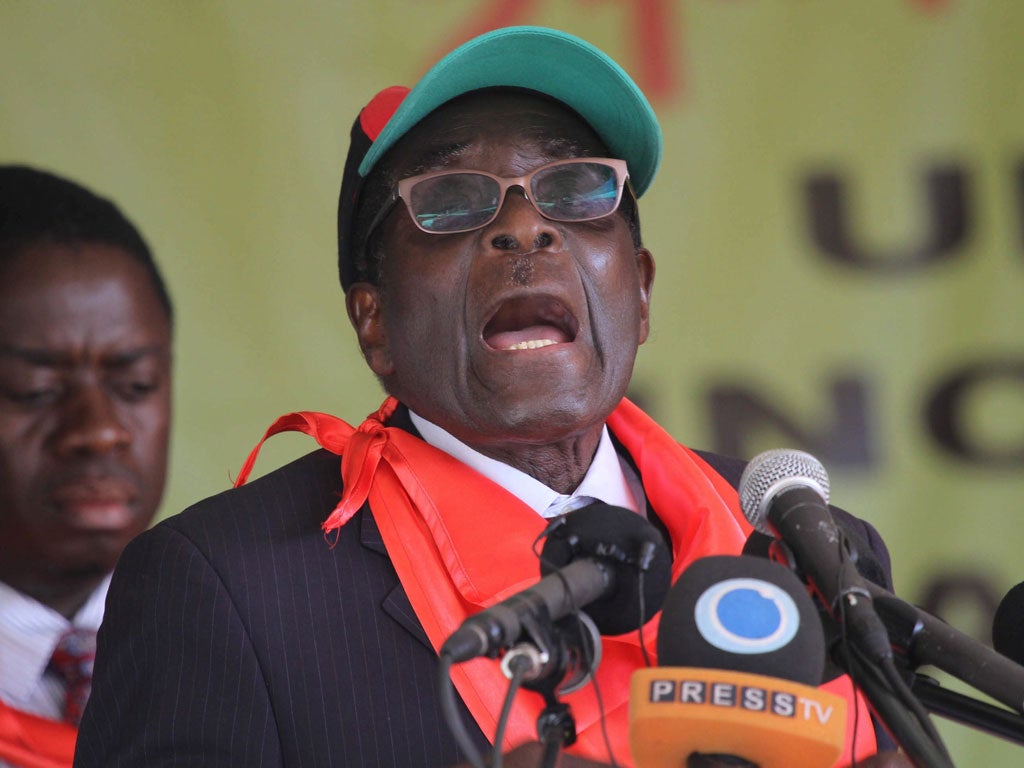How Mugabe won over Zimbabwe again
The President is gaining renewed popularity with an old formula. By Alex Duval Smith in Harare

He may face opprobrium abroad, but at home Robert Mugabe has soared back to popularity thanks to a campaign to turn over white-owned companies to black Zimbabweans. His indigenisation programme – the corporate version of the farm invasions a decade ago – on Tuesday netted its juiciest prey yet when the world's second-largest platinum miner, Impala, agreed to cede 51 per cent of its Zimbabwean arm, Zimplats.
The controversial Minister for Indigenisation and Youth, Saviour Kasukuwere, described the deal as a "historic moment for Zimbabwe and for the region" and called on black Africans to "reclaim their resources".
The Movement for Democratic Change (MDC), the opposition party which in 2009 formed a power-sharing government with Mr Mugabe's Zimbabwe African National Union - Patriotic Front (Zanu-PF), sees the indigenisation wave as a feeding frenzy by ruling-party cronies that will deter foreign investors.
But it is working for the 88-year-old president. In questionable health and in power for 32 years, Mr Mugabe has suddenly, in the eyes of many Zimbabweans, regained the revolutionary credentials he earned fighting white rule in the 1970s.
At the same time, the MDC has suffered its share of corruption scandals. It has failed to reverse poverty or define itself as a reforming force within the power-sharing administration.
In an interview with i, Mr Kasukuwere , 41, did not deny that indigenisation was favouring Zanu-PF "cronies". "Every nation must have a middle class, and if I can create an environment in which millions of Zimbabweans are cronies, then fine, good," he said. Mr Kasukuwere also denied that the programme was a ruinous electoral ploy. "We want to get our people out of poverty, who can be against that?"
Fourteen years ago, Zimbabwe was a breadbasket for southern Africa. Maize, tobacco and much more were produced by mostly white using a black workforce. Then Mr Mugabe launched the often-violent "fast-track land redistribution" drive.
Elections in the 2000s were violent, and in the 2008 presidential polls, Mr Mugabe finished neck-and-neck with MDC leader Morgan Tsvangirai. A South African-brokered unity government took office in 2009, with Mr Tsvangirai as Prime Minister. It brought hyperinflation under control but with a few exceptions, Zimbabweans are limping along under the burden of an economy going nowhere.
An agreement to move towards elections with a new constitution, meanwhile, has become mired in party infighting. Sensing his new-found popularity, the president has begun claiming he will call elections with or without a replacement constitution.
Ahead of the polls, Zanu-PF's recent popularity surge has wrong-footed the MDC. In the country, politics boils down not to delivery but to which party makes the best promises. And to many Zimbabweans, President Mugabe once again looks like the country's best defender.
Subscribe to Independent Premium to bookmark this article
Want to bookmark your favourite articles and stories to read or reference later? Start your Independent Premium subscription today.

Join our commenting forum
Join thought-provoking conversations, follow other Independent readers and see their replies
Comments